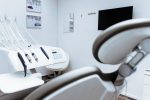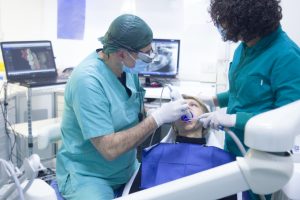
Choosing a career as a dental assistant places you in one of the top 25 medical support careers.
This key role in any dentist’s office provides clinical support, assists in dental procedures take x-rays of patient teeth, and much more.
Working under the supervision of both dentists and dental hygienists, you could work in a public institution such as a nursing home or prison, or private practice.
You can choose general dentistry or specialize in a specific area of the field of dentistry.
You can find jobs as a dental assistant in every type of dental practice from a community dentistry program to an oral surgery practice.
Many people use this job as a full-time permanent career, but others choose it as their entry point to a dentistry career by using their job to pay for further schooling.
Page Navigation
Pros of Being a Dental Assistant
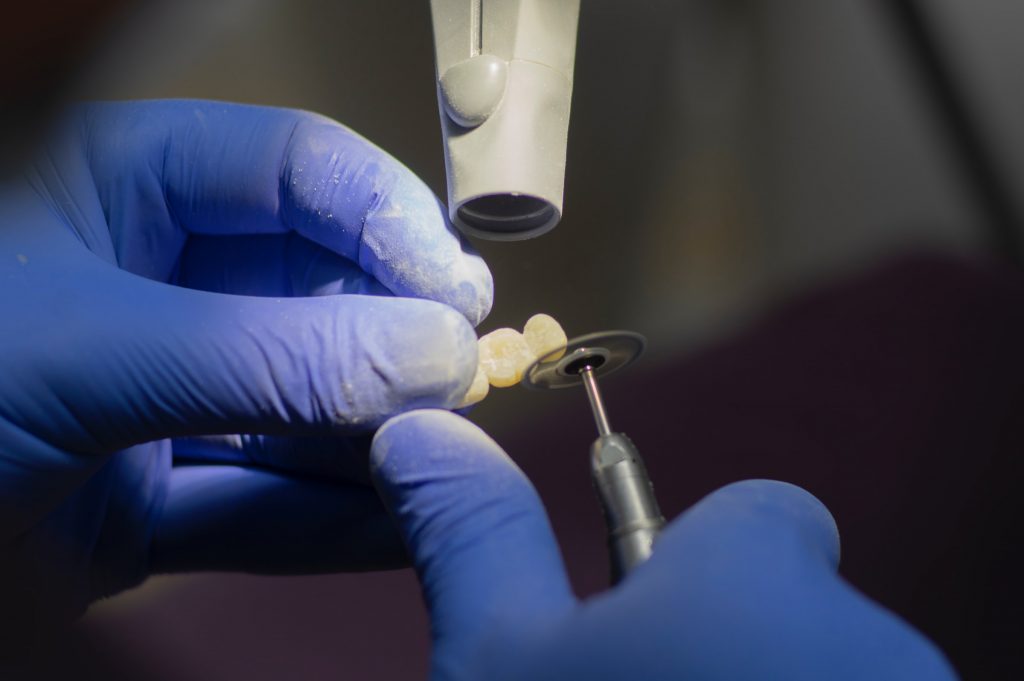
A lot of great reasons exist to choose a dental assistant career.
Let’s go through the pros first, which include a quick-to-complete educational requirement and readily available jobs.
You’ll have plenty of room for advancement, too, since this is the entry-level medical support position in the dental field.
Short, Low-cost Educational Program
You can complete a full dental assistant program at a vocational school or community college in less than one year.
These comprehensive programs cover all aspects of the job, including completing patient paperwork, learning digital dental radiography and x-rays, dental equipment and use, as well as prepping the examination room, including cleaning and sterilizing the instruments.
The program costs range from about $1,000 to $7,000 for a vocational program to $15,000 to $20,000 for an associate degree.
The Option of Online Training
You can choose to complete this program online.
In the past few years, many schools have created virtual training programs that allow students to take courses via online video.
This can eliminate your need to travel to a school for training.
Both in-person and online programs accept US financial aid, such as Pell grants and student loans.
You can shop around for a reasonably priced school and apply for financial aid.
Many Methods of Salary Increase
The median annual salary for a US dental assistant ranges from $37,630 to $41,180, according to the Bureau of Labor Statistics.
Your salary depends on your education, experience, location, industry, and job duties.
You can improve your salary by earning certifications and completing additional training.
Earning your Dental Assistant National Board Certification (DANB) can increase your salary.
The certification requires passing a board exam after completing the dental assistance coursework.
Obtaining a certification in administering cardiopulmonary resuscitation (CPR) also can help you increase your salary.
Flexible Schedules Available
You won’t have to work Monday through Friday.
Many offices offer a schedule of Tuesday through Saturday to provide their patients with a non-workday that they’re open.
About 30 percent of the individuals in this job work a part-time schedule.
The rest work a full-time schedule, but they can choose their days.
Because some offices remain open after 5 pm to provide emergency assistance, you can sometimes schedule a ten-hour workday and get a four-day workweek.
This provides you with a weekday off to run errands and schedule your appointments.
Positive Job Growth Through 2030
While some job fields have grown stagnant, the career of dental assistant keeps growing.
By 2030, the job field is expected to grow by 11 percent.
This means more career opportunities for you, especially if the same number of individuals continue to study the field.
You’ll have less competition for the jobs available.
You Will Have the Option for Career Advancement
Far from a terminal position, as a dental assistant, you are in an entry-level position in the field.
You can continue to take courses at a college or vocation school to become a dental laboratory technician or dental hygienist.
Since you can study for these programs online, too, you can go to school while working, which makes paying the bills much more comfortable.
You can also continue your education to become an educator and teach others how to become a dental assistant.
You Could Work in Different Specialties
You can specialize in the field of dentistry.
Rather than a position in an office of general dentistry, you might specialize in periodontics, oral surgery, community dentistry, pediatric dentistry, orthodontics, maxillofacial surgery, prosthodontics, periodontology, or preventive dentistry.
If you decide to continue with your schooling, you can keep your specialty area because most practices also have positions for lab techs and hygienists.
Cons of Being a Dental Assistant
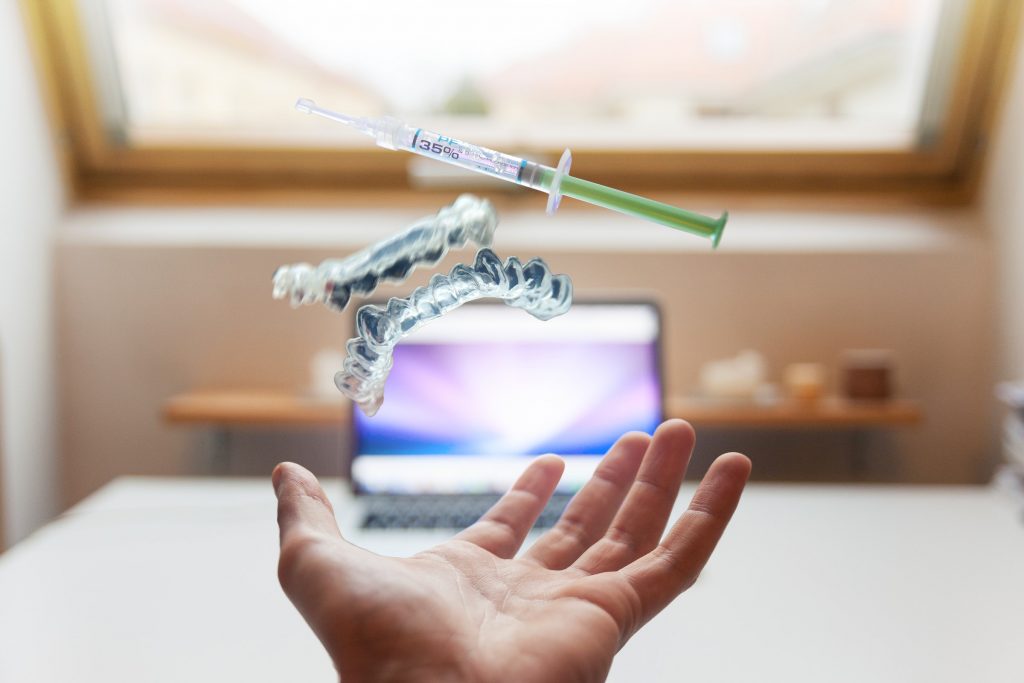
Although it pays well and provides flex hours, just as many cons exist to taking the job of a dental assistant.
Part of this extends to the scheduling while much of it relates to the so-called grunt work of the dentistry office.
Weekends and Evening Schedules
Sometimes, the dental practice will need you to work weekends and evenings.
You might be short-staffed or have staff who experience an emergency.
Even if you typically work a Monday to Friday schedule of 8 am to 5 pm, you may sometimes need to take a shift you don’t want to take.
This happens in nearly every career though, so you’ll see it as a con of many jobs.
It’s a fact of life though.
You may need to work late if a patient comes in with an emergency.
Close Patient Proximity
If you aren’t a people person, this is not a job for you.
Dental assistants spend much of their time close to a patient’s mouth.
If you don’t deal well with strangers and bad breath puts you off, this is not your job.
You’ll need to feel comfortable touching the patient, sometimes placing your hands in their mouth, and inserting trays and other items.
It will be your job to take dental impressions of their teeth when they need Invisalign, whitening trays, or dentures.
Exposure to Pathogens and Bodily Fluids
You do work with hazardous materials as a general dentistry dental assistant.
You could be exposed to a patient’s infectious disease or to germs they carry.
You do experience a greater risk of contracting COVID-19, flu, hepatitis, and herpes.
You will need to clean dental equipment covered in blood and pus.
You disinfect the equipment following each patient visit.
Job Lacks Autonomy
Dental assistants have zero autonomy regarding patient management or their workday schedule.
You work under the dentist’s supervision with a dental hygienist as your direct manager.
Job Lacks Challenges
If you love routine, you get plenty as a dental assistant.
Repetition lets you get great at what you do, but most of the work lacks challenge.
Once you complete the schooling and work in the job for a few months, you know what there is to know and that’s it.
Your only way to take on a challenge is to further your education and obtain a promotion to a new job.
Exposure to X-rays
In addition to the pathogens and bodily fluids, you also get exposed to large amounts of radiation from administering x-rays.
If you forget a precaution or aren’t careful, you can expose yourself to a great deal of radiation.
This could lead to cancer or congenital disabilities in your offspring if you have children after taking the job.
Requires Superior Communication Skills
You must have superior communication skills.
This job for a people person requires an emotionally intelligent person who can deal with anxious, unpleasant, or upset patients.
Many people experience genuine terror at going to the dentist.
Part of the dental assistant job relates to calming them down and handling their needs.
Should You Become a Dental Assistant?
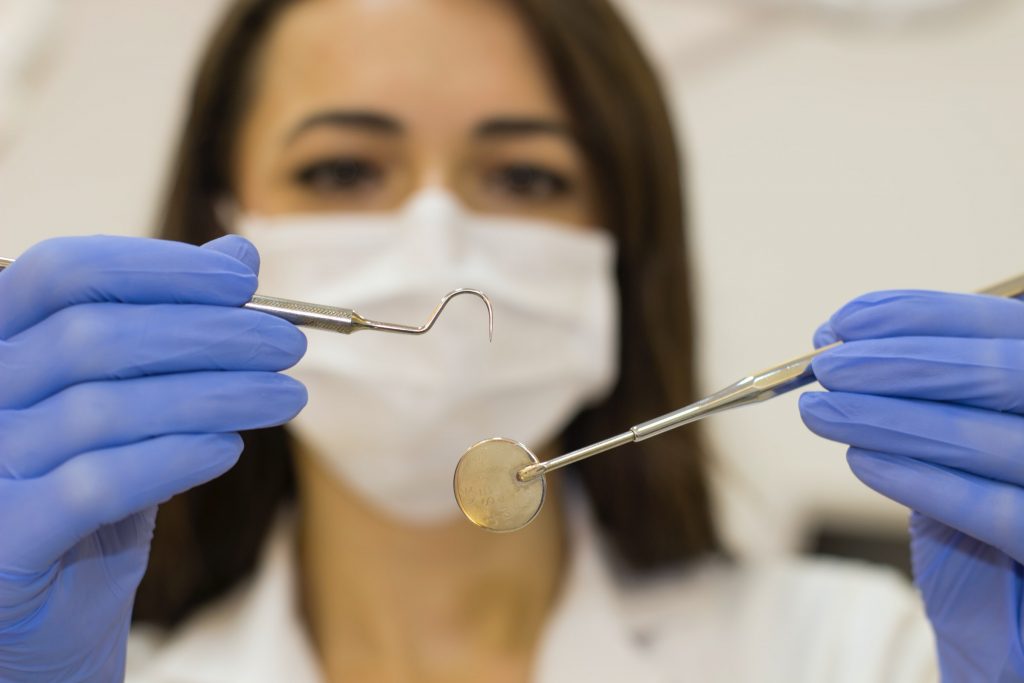
If you love helping people and want to see people smile and improve their self-esteem, a job as a dental assistant might work for you.
You can earn a median income of about $40K and the position offers tons of room for advancement.
Some dental assistants go on with their schooling to become dentists.
Since the assistant job pays well and provides baseline training, many individuals go to school part-time after landing this job.
While you do have to work with bodily fluids and X-rays, this remains true of any career in dentistry or medicine.
You get to work a flexible schedule and obtain a full-time job that pays well and provides fulfillment since you help people keep or restore their smiles.
Pros and Cons of Being a Dental Assistant Summary Table
| Pros of Being a Dental Assistant | Cons of Being a Dental Assistant |
|---|---|
| Short, Low-cost Educational Program | Weekends and Evening Schedules |
| The Option of Online Training | Close Patient Proximity |
| Many Methods of Salary Increase | Exposure to Pathogens and Bodily Fluids |
| Flexible Schedules Available | Job Lacks Autonomy |
| Positive Job Growth Through 2030 | Job Lacks Challenges |
| You Will Have the Option for Career Advancement | Exposure to X-rays |
| You Could Work in Different Specialties | Requires Superior Communication Skills |


